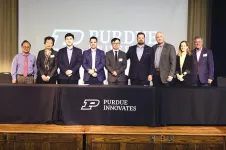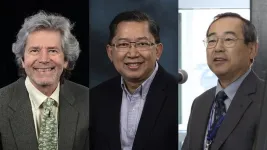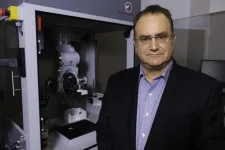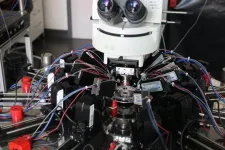(Press-News.org) WEST LAFAYETTE, Ind. — ReElement Technologies on Thursday (April 18) signed an exclusive license to use patented Purdue University technologies to domestically refine and sell minerals critical in manufacturing modern, high-tech products for commercial and industrial use.
The license was signed during the Purdue Innovates Startup and Technology Expo 2024 at the Purdue University Memorial Union.
Sourcing rare earth and critical battery elements
Rare earth elements are foundational essentials in permanent magnets found in hard drives, electric vehicles, wind turbines and many other advanced applications. Critical battery elements such as lithium, nickel, cobalt and manganese power advanced energy efforts through battery technologies.
CEO Mark Jensen of ReElement said most rare earth and battery elements are obtained today from foreign countries, notably China.
“This is problematic for two reasons,” Jensen said. “First, not having a fully domesticated supply chain poses a national security concern. Second, traditional mining processes used in foreign countries are outdated and produce enormous amounts of pollution.”
Jensen said efforts to return rare earth and battery element production to the U.S. have been unsuccessful due to low labor costs in foreign countries.
ReElement President Ben Wrightsman said that even secondary uses and refining of rare earth elements depend on China.
“Rare earths are utilized globally, and yet nearly all roads lead from, through and back to China,” Wrightsman said. “It is imperative that we ensure a global ecosystem and establish independent versus limited-source, single-dependent, refining supply chains.”
Wrightsman said this partnership and technology deployment with Purdue will ensure the U.S. can gain a necessary independence for rare earths and critical minerals.
The Purdue rare earth elements innovation
Nien-Hwa “Linda” Wang, a researcher in Purdue’s College of Engineering, leads a team that developed innovative technologies to separate and purify rare earth and battery elements from a variety of sources including ores, postindustrial wastes and recycled magnets. Wang is the Dr. Norman and Dr. Jane Li Professor in Chemical Engineering in Purdue’s Davidson School of Chemical Engineering.
The innovations improve upon current industrial methods by using significantly less power and water and fewer hazardous chemicals while generating near-zero waste. They also have a higher extraction yield, higher purity, smaller footprint and higher efficiency than traditional industrial methods to source rare earth and battery elements.
About the license and commercialization
ReElement initially licensed Wang’s rare earth elements technology in 2021 from the Purdue Innovates Office of Technology Commercialization. The license agreement signed April 18 significantly expands the fields of use and allows the company to separate and purify rare earth and battery elements from any feedstock material.
The company has developed commercial-scale processes based on the Purdue technologies. It is constructing its first commercial facility in Marion, Indiana, with the expectation to initially hire 40-60 employees, eventually growing to over 250 full-time employees on-site. Production of rare earth elements and the company’s first sales are anticipated to begin in late 2024.
What they’re saying
Mark Jensen, CEO, ReElement Technologies: “ReElement and Purdue technology will ensure that finite resources and associated supply chains are now far more infinite and independent. These are both critical to supporting the advanced energy economy here in the U.S. and globally.”
Dan Hasler, founder and president, Hasler Ventures LLC: “Our economy and national security are totally dependent on separated and purified rare earth metals nearly solely produced in China. We’ve got to get serious about creating a domestic supply chain that ends with final high purity product, and this technology looks to be the enabler.”
Linda Wang, Dr. Norman and Dr. Jane Li Professor in Chemical Engineering, Purdue University: “My students and I are thrilled that ReElement Technologies is bringing this method to separate and purify rare earth and battery elements to the market. Its impact will be felt not only by industry but by people who care about the environment. There have been a lot of people who have worked with me, from the College of Engineering to the Purdue Innovates Office of Technology Commercialization, to funders at the state and federal level. Developing this technology has taken many years, but it is ready for the next giant leap of commercialization.”
Brooke Beier, senior vice president, Purdue Innovates: “The success story of ReElement commercializing Purdue-discovered technology is another example of how Purdue Innovates supports university researchers, industry and efforts to strengthen our national security. Our team worked with the lead inventor, Linda Wang, to vet and protect her intellectual property and worked with ReElement leadership to bring it to market and impact the state of Indiana’s economic development with new jobs.”
About ReElement Technologies
ReElement Technologies is committed to leading the domestic supply chain for rare earth and battery elements in the electrified economy. The company has proven that its patented chromatographic separation and purification are low-cost, scalable, flexible and environmentally safe replacements for the existing environmentally and ethically hazardous alternatives used around the globe for rare earth and critical element separation and purification.
About Purdue Innovates Office of Technology Commercialization
The Purdue Innovates Office of Technology Commercialization operates one of the most comprehensive technology transfer programs among leading research universities in the U.S. Services provided by this office support the economic development initiatives of Purdue University and benefit the university’s academic activities through commercializing, licensing and protecting Purdue intellectual property. In fiscal year 2023, the office reported 150 deals finalized with 203 technologies signed, 400 disclosures received and 218 issued U.S. patents. The office is managed by the Purdue Research Foundation, which received the 2019 Innovation and Economic Prosperity Universities Award for Place from the Association of Public and Land-grant Universities. In 2020, IPWatchdog Institute ranked Purdue third nationally in startup creation and in the top 20 for patents. The Purdue Research Foundation is a private, nonprofit foundation created to advance the mission of Purdue University. Contact otcip@prf.org for more information.
About Purdue University
Purdue University is a public research institution demonstrating excellence at scale. Ranked among top 10 public universities and with two colleges in the top four in the United States, Purdue discovers and disseminates knowledge with a quality and at a scale second to none. More than 105,000 students study at Purdue across modalities and locations, including nearly 50,000 in person on the West Lafayette campus. Committed to affordability and accessibility, Purdue’s main campus has frozen tuition 13 years in a row. See how Purdue never stops in the persistent pursuit of the next giant leap — including its first comprehensive urban campus in Indianapolis, the new Mitchell E. Daniels, Jr. School of Business, and Purdue Computes — at https://www.purdue.edu/president/strategic-initiatives.
Writer/Media contact: Steve Martin, sgmartin@prf.org
Sources: Mark Jensen, mcj@americanresourcescorp.com
Ben Wrightsman, bmw@reelementtech.com
END
Returning rare earth element production to the United States
ReElement Technologies licenses Purdue critical mineral refining tech and will begin production in late 2024
2024-04-18
ELSE PRESS RELEASES FROM THIS DATE:
University of Houston Professor Kaushik Rajashekara elected International Fellow of the Engineering Academy of Japan
2024-04-18
Kaushik Rajashekara, Distinguished Professor of Engineering at the University of Houston Cullen College of Engineering, continues to receive recognition and awards on a global scale. The man who ushered in the era of electric cars, working on the General Motors EV1 in 1995 when he was a Technical Fellow there, has been elected an International Fellow of the Engineering Academy of Japan, recognized for his contributions to power conversion and, of course, electrification of transportation.
According to the academy, Rajashekara’s ...
Solving antibiotic and pesticide resistance with infectious worms
2024-04-18
To study how parasites evolve to break the defenses of their hosts, the National Institutes of Health has granted UC Riverside nematologist Simon “Niels” Groen a $1.9 million Outstanding Investigator Award.
Roundworm parasites infect humans, livestock, and crop plants. Insights into why certain worms can evade host immune protections could help preempt a ticking time bomb: the decreasing effectiveness of pesticides and antibiotics for infections.
Bacterial, fungal, and parasite resistance to drugs and pesticides is making it harder, and sometimes impossible, to treat common infections ...
Three ORNL scientists elected AAAS Fellows
2024-04-18
Three scientists from the Department of Energy’s Oak Ridge National Laboratory have been elected fellows of the American Association for the Advancement of Science, or AAAS, the world’s largest general scientific society and publisher of the Science family of journals.
"Keith Kline, Rigoberto Advincula and Takeshi Egami have delivered significant impact for the scientific community," said ORNL Director Stephen Streiffer. "This distinguished honor highlights their commitment, hard work and leadership in their respective fields. I offer my congratulations to them on this well-deserved recognition.”
AAAS ...
Rice bioengineers win $1.4 million ARPA-H grant for osteoarthritis research
2024-04-18
HOUSTON – (April 18, 2024) – Bioengineers at Rice University have been awarded $1.4 million as part of a multi-center consortium funded by the Advanced Research Projects Agency for Health (ARPA-H) to develop strategies for reversing the effects of osteoarthritis.
“We’re thrilled to be a part of this collaborative effort to tackle one of the most challenging degenerative joint diseases and develop, test and commercialize solutions for patients,” said Antonios Mikos, the Louis Calder Professor of Chemical Engineering and professor of bioengineering ...
COVID-19 booster immunity lasts much longer than primary series alone, York University-led study shows
2024-04-18
April 18, 2024, TORONTO – Thinking about getting a spring-time booster shot? A new study coming out of York University’s Centre for Disease Modelling in the Faculty of Science shows that immunity after a COVID-19 booster lasts much longer than the primary series alone. These findings are among other, sometimes “unintuitive,” revelations of how factors like age, sex and comorbidities do and don’t affect immune response.
The study’s authors – York Post Doctoral researchers Chapin ...
Bentham Science joins United2Act
2024-04-18
Bentham Science Publishers is now a signatory organization of United2Act's consensus statement on paper mills.
We are committed to upholding the highest standards of research integrity in academic and scientific publishing. Part of the effort to uphold integrity in scientific publishing includes preventing publication from fraudulent 'paper mills' which negatively impact the credibility of research. We fully support the COPE position statement on this critical issue.
The intrusion of fraudulent papers into the publication record not only undermines public trust in research but also poses significant risks to ...
When thoughts flow in one direction
2024-04-18
Contrary to previous assumptions, nerve cells in the human neocortex are wired differently than in mice. Those are the findings of a new study conducted by Charité – Universitätsmedizin Berlin and published in the journal Science.* The study found that human neurons communicate in one direction, while in mice, signals tend to flow in loops. This increases the efficiency and capacity of the human brain to process information. These discoveries could further the development of artificial neural networks.
The neocortex, a critical structure for human intelligence, is less than five millimeters thick. There, in the outermost layer of the brain, 20 billion neurons process ...
Scientists identify airway cells that sense aspirated water and acid reflux
2024-04-18
Scientists Identify Airway Cells That Sense Aspirated Water and Acid Reflux
The new work by UCSF researchers could lead to interventions to prevent pneumonia or treat certain types of chronic cough.
When a mouthful of water goes down the wrong pipe – heading toward a healthy person’s lungs instead of their gut – they start coughing uncontrollably. That’s because their upper airway senses the water and quickly signals the brain. The same coughing reflex is set off in people with acid reflux, when acid from the stomach reaches the throat.
Now, UC San Francisco scientists have identified the rare type of cell responsible ...
China’s major cities show considerable subsidence from human activities
2024-04-18
The land under nearly half of China’s major cities is undergoing moderate to severe subsidence, affecting roughly one-third of the nation’s urban population, according to a systematic national-scale satellite assessment. The findings suggest that within the next century, 22 to 26% of China’s coastal land will have a relative elevation lower than sea level, putting hundreds of millions of people at elevated risk of flooding due to sea-level rise. Over the last several decades, China has experienced one of the most rapid and extensive urban expansions in human history. This massive wave of urbanization may be threatened ...
Drugs of abuse alter neuronal signaling to reprioritize use over innate needs
2024-04-18
Drugs of abuse, like cocaine and opioids, alter neuronal signaling in the nucleus accumbens (NAc), hijacking a key brain reward system involved with the fulfillment of innate needs for survival, according to a new study in mice. The findings provide mechanistic insights into the intensification of drug-seeking behaviors in substance use disorders. Persistent drug use is accompanied by a profound reprioritization of motivations, skewing decision-making behaviors toward a myopic focus on drug use over other innate needs, like eating or drinking water, often ...
LAST 30 PRESS RELEASES:
Kidney cancer study finds belzutifan plus pembrolizumab post-surgery helps patients at high risk for relapse stay cancer-free longer
Alkali cation effects in electrochemical carbon dioxide reduction
Test platforms for charging wireless cars now fit on a bench
$3 million NIH grant funds national study of Medicare Advantage’s benefit expansion into social supports
Amplified Sciences achieves CAP accreditation for cutting-edge diagnostic lab
Fred Hutch announces 12 recipients of the annual Harold M. Weintraub Graduate Student Award
Native forest litter helps rebuild soil life in post-mining landscapes
Mountain soils in arid regions may emit more greenhouse gas as climate shifts, new study finds
Pairing biochar with other soil amendments could unlock stronger gains in soil health
Why do we get a skip in our step when we’re happy? Thank dopamine
UC Irvine scientists uncover cellular mechanism behind muscle repair
Platform to map living brain noninvasively takes next big step
Stress-testing the Cascadia Subduction Zone reveals variability that could impact how earthquakes spread
We may be underestimating the true carbon cost of northern wildfires
Blood test predicts which bladder cancer patients may safely skip surgery
Kennesaw State's Vijay Anand honored as National Academy of Inventors Senior Member
Recovery from whaling reveals the role of age in Humpback reproduction
Can the canny tick help prevent disease like MS and cancer?
Newcomer children show lower rates of emergency department use for non‑urgent conditions, study finds
Cognitive and neuropsychiatric function in former American football players
From trash to climate tech: rubber gloves find new life as carbon capturers materials
A step towards needed treatments for hantaviruses in new molecular map
Boys are more motivated, while girls are more compassionate?
Study identifies opposing roles for IL6 and IL6R in long-term mortality
AI accurately spots medical disorder from privacy-conscious hand images
Transient Pauli blocking for broadband ultrafast optical switching
Political polarization can spur CO2 emissions, stymie climate action
Researchers develop new strategy for improving inverted perovskite solar cells
Yes! The role of YAP and CTGF as potential therapeutic targets for preventing severe liver disease
Pancreatic cancer may begin hiding from the immune system earlier than we thought
[Press-News.org] Returning rare earth element production to the United StatesReElement Technologies licenses Purdue critical mineral refining tech and will begin production in late 2024







